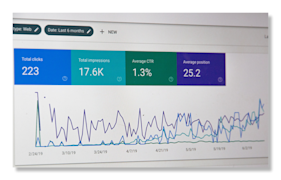How do search engines work?
The internet is a vast and extensive network of information, pages upon pages on a variety of topics. It can feel overwhelming when you’re looking for something specific, as there are often several articles on the same subject in competition. But, how do users know which information to privilege? When you’re looking for information on a subject, how will you know which pages to read, and further, how do search engines even work?
Internet search engines are specifically designed to help you find the information you’re looking for. As a growing business or an entrepreneur, it is important to understand the basics of search engines operations. If you’re in this position, or just curious, read further to find out exactly how search engines work.
Here's how search engines work!
The basic function of search engines
There are differences between search engines, but each of them performs 3 basic functions. These functions are:
Search engines select articles based on important words
They keep an index of these keywords, as well as where to find them
They allow users to look for words or combinations of works found in the index
In the early days of the internet, a search engine only held onto a few hundred thousand pages and documents. Now, the top search engines will index hundreds of millions of pages and keywords, alongside responding to millions of inquiries a day. Think of the search engine as a structured network, with different stops that are all unique documents.
However, these search engines need a way to perform these searches, crawling across networks and looking for the best available path to relevant information, also known as links.
Links
The link structure that guides most internet search engines works by way of automated devices that are referred to as crawlers. These crawlers reach billions of interconnected web documents that are dispersed throughout the internet. Search engines work to find these pages, storing them in databases. These databases are accessed when certain keywords, phrases or questions are researched. Datacenters exist all over the world, and this is how billions of pages can be accessed in a split second.
The storage facilities that hold all of these machines have the ability to process large quantities of information quickly. Providing answers may seem like a swift process, as most users will be dissatisfied if they wait for a second or more for their results to process. However, searching these vast databases for the correct information is far more complicated than you might believe.
How do search engines provide you with the right answer?
Search engines can be thought of as machines which are strictly in place to provide answers. When you search for something online, the search engine you are using works by scouring billions of online documents that it has already processed for keywords and phrases. Following this, it does two things to provide you with answers.
First, the search engine garners results that are only relevant to the words you’ve searched; second, it ranks these results by popularity. Therefore, relevance related to your subject as well as the popularity of the site are what drives the ranking of search results. Now, how exactly do search engines determine how relevant or popular a web page is?
Hundreds of factors play a role in how search engines measure the relevance of an article. However, some of these factors are more important than others.
As the internet becomes more advanced, engineers have devised better ways to match search results to questions users ask. As mentioned, the popularity of a site usually determines how relevant it is assumed to be by the search engine.
Search engines assume that the more a website is popular, the more valuable the information must be. Of course, these factors are not determined manually. Instead, algorithms, or mathematics, are used to determine relevance and then to rank the relevance based on quality, or popularity. Algorithms comprise several factors and hundreds of variables, and these are often referred to as “ranking factors.”
What is SEO (Search Engine Optimization)?
Search engine optimization, or SEO, is one of the top ways for a website to be ranked as popular or relevant. This process is done by creating a useful site that is rich with information while employing specific keywords that will help focus relevance.
Pages that are written clearly, accurately and outline your content will rank higher in search results. Further, employing relevant titles is helpful for a website's SEO. Keywords should be descriptive and human-friendly, and of course, be relevant to your content. For a more in-depth look at SEO, and how search engines work, you should check out this article!
Once you've read and understood all of this, the next step consists in improving your website's ranking on search engines. To do so, check out "How to Get Your Website to Appear on Google".



